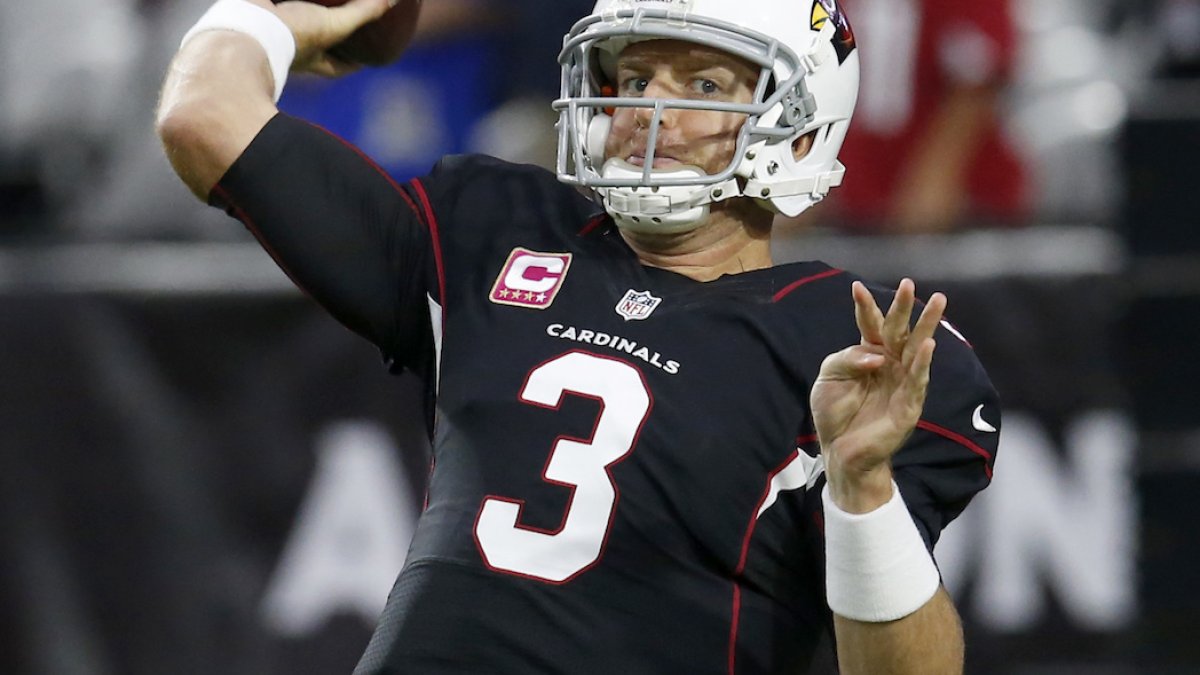When PFF put Carson Palmer in our mid-season All-Pro team it was met with plenty of pushback from Tom Brady supporters who believed Brady to be the only correct name for that spot. Heading into this week Brady and Palmer were actually even with a 96.8 grade in our system, tied for best in the league, so we were literally splitting two players with nothing between them.
Our analysts eventually decided that what Palmer was doing within the Arizona Cardinals’ offense was marginally more impressive than what Brady was doing within the Patriots', and so he earned the spot.
This week saw some evidence to back that up. Palmer made some of the most spectacular throws of the week despite heavy and sustained pressure by the Seahawks, and cemented his place as the best quarterback in the NFL this season by leading Arizona to a critical division road victory.
Brady was far from poor this week, and did mount a game-winning drive to topple the Giants, but did so only after gift-wrapping the game to them by airmailing a horrendous pass straight to Giants rookie safety Landon Collins, who dropped it.
This isn’t to knock Brady, but merely to illustrate that he too has poor passes that people were using to slight Palmer, it’s just that so far this season his have yet to cost the team through the ineptitude of opposition players. If Collins hangs on to that ball, the Patriots lose the game because of a Brady mistake — much like happened to Palmer against the Steelers earlier in the year.
But let’s focus on Palmer and the job he is doing within one of the league’s most demanding offenses. Arizona head coach Bruce Arians likes to attack deep down the field, which makes his system a rare throwback in a league that is becoming ever more horizontal when it comes to stretching a defense. Brady averages 7.7 yards down the field with every pass attempt. The league average depth of target is 8.7. Palmer’s average depth of target is a league-leading 11.5 yards.
He is attacking the intermediate and deep levels of the defense with an unheard-of efficiency, despite an offensive line that sees him pressured on 42.2 percent of his dropbacks – the third-most in the NFL.
On passes that travel 10-plus yards from the line of scrimmage, Palmer is completing 61.8 percent of his passes for a passer rating of 120.6 on the season. Against Seattle, he was 14 of 18 on those plays. These are the throws with the tightest windows and are the most difficult to hit regularly.
Palmer was our third-highest-graded quarterback of the week, and the only thing holding him back from another excellent grade was two fumbles, both of which were recovered by Seattle and showed poor ball security by Palmer. With turnovers so important in determining the victor of any game, PFF’s system is hard on players that put the ball on the ground, and those plays often get forgotten when evaluating quarterback performance.
Part of being a great quarterback is understanding when a play is dead and going into damage limitation mode. Being sacked is bad, but coughing the ball up in that sack and handing it to the opposition in the shadow of your goal line is so much worse.
Palmer’s ball security hurt his team, but both fumbles came after catastrophic breakdowns in the Cardinals' protection, something he has been dealing with all season.
What makes both Brady's and Carson Palmer’s MVP credentials so strong are the holes they are papering over around them. Both players are masking deficiencies on their offensive lines via different methods, and while Brady’s role might be producing more gaudy statistics for him personally, Palmer’s role is arguably a tougher one to execute with such incredible efficiency.
Right now, Palmer is the best quarterback in the NFL.



 © 2024 PFF - all rights reserved.
© 2024 PFF - all rights reserved.